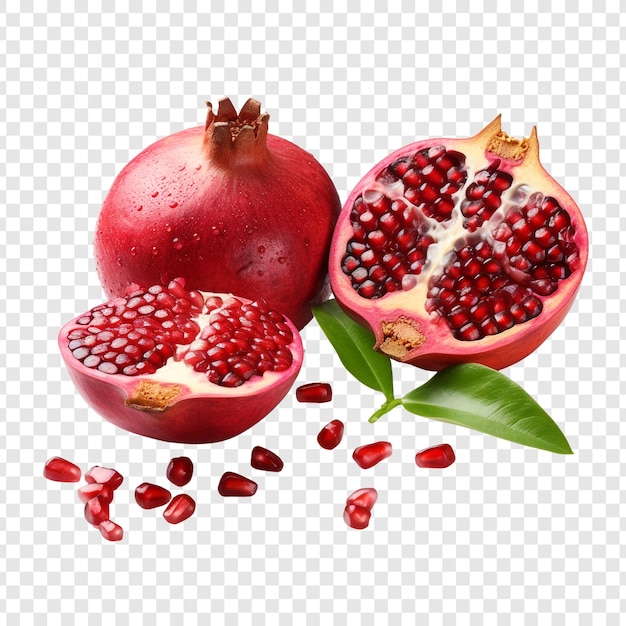Best Pomegranate Benefits
1. Pomegranates Are a Dense Source of Nutrients
Pomegranates are packed with vitamins and minerals. The seeds, also known as arils, are rich in fiber and essential micronutrients. Here’s a nutritional breakdown for one cup of pomegranate arils:
1 Cup Pomegranate Seeds (Arils)
g=grams, mg=milligrams
| Protein | 2.91 g |
| Carbohydrates | 32.54 g |
| Fiber | 7 g |
| Sugar | 23.79 g |
| Iron, Fe | 0.52 mg |
| Magnesium, Mg | 21 mg |
| Phosphorus, P | 63 mg |
| Potassium, K | 411 mg |
| Sodium, Na | 5 mg |
| Vitamin C | 17.7 mg |
| Thiamin | 0.117 mg |
| Riboflavin | 0.092 mg |
| Niacin | 0.51 mg |
| Vitamin B6 | 0.13 mg |
| Vitamin E | 1.04 mg |
| Vitamin K | 28.5 mg |
2. Pomegranates Contain Powerful Antioxidants
Pomegranates are rich in anthocyanins and punicalagins, both of which are potent antioxidants. Including foods high in antioxidants in your diet can help reduce damage from free radicals, which are linked to various health issues and cellular aging. Some studies even suggest pomegranates support healthy tissue growth at the cellular level.
3. Pomegranates Promote Cellular Integrity
Your body’s cells are constantly exposed to agents that cause oxidative stress, leading to the release of 8-Oxo-DG, a marker you don’t want in high levels. Elevated 8-Oxo-DG is associated with muscle weakness, liver dysfunction, aging skin, and diminished brain function. Research indicates that consuming pomegranates or their extracts can help lower levels of 8-Oxo-DG.
4. Pomegranates Encourage Healthy Aging
Pomegranates are rich in polyphenols called ellagitannins, which metabolize into a compound known as urolithin A (UA). Studies show that UA can combat age-related decline, preserving exercise capacity and muscle function by supporting mitochondrial health.
5. Pomegranates Support Brain Health and Memory
Advanced glycation end products (AGEs) form when proteins and fats combine with sugars, typically during high-temperature cooking. AGEs are implicated in neurological decline, type-II diabetes, and Alzheimer’s disease. Punicalagins in pomegranates may inhibit the formation of AGEs in food or reduce their effects in the body.
6. Pomegranates Help Protect Against Harmful Organisms
There’s evidence that pomegranate rind extract can defend against harmful organisms. One study found that a pomegranate-based preparation improved treatment outcomes for antibiotic-resistant bacteria. Another study showed that pomegranate peel contains phytochemicals that promote fungal balance.
7. Pomegranates Soothe Red, Irritated Tissue
Irritated tissue inside the body can negatively impact health. Pomegranates contain polyphenols that help reduce irritation, which can promote overall wellness and protect against serious health conditions. A study involving 48 obese and overweight participants found that pomegranate supplementation reduced systemic irritation.
8. Pomegranates Support Heart Health
Some studies suggest that punicalagins in pomegranates benefit heart and vascular health. In one study, participants who drank one ounce of pomegranate juice daily for a year saw an average 12% reduction in blood pressure and a 30% decrease in atherosclerotic plaque levels.
9. Pomegranates Contribute to Prostate Health
Lycopene, a phytochemical in red fruits and vegetables like pomegranates, supports prostate health. A study indicated that a diet rich in lycopene is beneficial for prostate health, with pomegranates being one of the sources of this nutrient.
10. Pomegranates May Help With Joint Health
Osteoarthritis is a common and painful condition. Research shows that pomegranate juice can improve knee function and reduce cartilage breakdown in people with knee osteoarthritis. Other studies found that pomegranates support overall wellness in individuals with rheumatoid arthritis.
11. Pomegranates Can Boost Exercise and Performance
Pomegranates might enhance your workout performance. A study found that taking pomegranate extract 30 minutes before exercise could improve blood flow and delay fatigue. Another study linked pomegranate juice to better recovery after strength training.
12. Pomegranates May Improve Your Mood
Research suggests that pomegranates can benefit mental and emotional health. In a study with both men and women, drinking pomegranate juice improved mood, outlook, and response to anxiety.
How to Add Pomegranates to Your Diet
Eat Raw, Organic, Locally-Grown Pomegranates
Being mindful of where your food originates and how it’s grown is important. Eating organic pomegranates is a great way to ensure you’re getting quality nutrition. The seeds make a nutritious, crunchy snack, and pomegranate juice is an easy way to consume antioxidants and nutrients.
Can’t Buy Organic? Grow Your Own!
If you can’t find organic pomegranates, consider growing your own. Pomegranate trees thrive in well-drained soil and love full sun and warmth. They are fairly drought-tolerant and can grow in partial shade. It’s best to buy cuttings from a local nursery, about fifteen inches long. Be patient; pomegranate trees typically yield fruit about three years after planting. The ripe fruit has a deep red color and produces a tinny, metallic sound when tapped. An average pomegranate tree produces around 8-10 fruits per crop and can bear two to three crops a year.

